We Will Be Heard
We Will Be Heard
Womens Struggles for Political Power in the United States
Jo Freeman

ROWMAN & LITTLEFIELD PUBLISHERS, INC.
Published in the United States of America
by Rowman & Littlefield Publishers, Inc.
A wholly owned subsidiary of The Rowman & Littlefield Publishing Group, Inc.
4501 Forbes Boulevard, Suite 200, Lanham, Maryland 20706
www.rowmanlittlefield.com
Estover Road, Plymouth PL6 7PY, United Kingdom
Copyright 2008 by Jo Freeman
All rights reserved. No part of this publication may be reproduced, stored in a retrieval system, or transmitted in any form or by any means, electronic, mechanical, photocopying, recording, or otherwise, without the prior permission of the publisher.
British Library Cataloguing in Publication Information Available
Library of Congress Cataloging-in-Publication Data
Freeman, Jo.
We will be heard : womens struggles for political power in the United States / Jo Freeman.
p. cm.
Includes bibliographical references and index.
ISBN-13: 978-0-7425-5607-2 (cloth : alk. paper)
ISBN-10: 0-7425-5607-7 (cloth : alk. paper)
ISBN-13: 978-0-7425-5608-9 (pbk. : alk. paper)
ISBN-10: 0-7425-5608-5 (pbk. : alk. paper)
1. WomenUnited StatesPolitics and government. 2. Power (Social sciences)United StatesHistory. 3. FeminismUnited States. 4. Political participationUnited StatesHistory. 5. Women in politicsUnited StatesHistory. 6. United StatesPolitics and government. I. Title.
HQ1236.5.U6F746 2008
324.082'0973dc22
2007038762
Printed in the United States of America
 The paper used in this publication meets the minimum requirements of American National Standard for Information SciencesPermanence of Paper for Printed Library Materials, ANSI/NISO Z39.48-1992.
The paper used in this publication meets the minimum requirements of American National Standard for Information SciencesPermanence of Paper for Printed Library Materials, ANSI/NISO Z39.48-1992.
To
Ted Lowi
Aaron Wildavsky
and Ed Artinian
Three men who encouraged me to write about women.
When you enter the party... you will find yourself in a political penumbra where most of the men are.... If you stay long enough... you will discover a little denser thing... the numbra of the... party, the people... planning the platform and picking out the candidates doing the real work that you and the men sanction at the polls. You wont be so welcome, but there is the place to go.
Carrie Chapman Catt,
speech at NAWSAs Victory Convention,
held in Chicago in February 1920

Contents

Preface and Acknowledgments
Only in the last twenty years has women and politics been accepted as a legitimate field of scholarly inquiry, yet women have been involved in mainstream electoral politics in the United States for over 120 years. This book looks at some of their struggles to participate in U.S. politics from the first attempt to organize women as a crucial component of a major political party in 1892 to the swearing in of a woman as Speaker of the U.S. House of Representatives on January 4, 2007the highest elected position attained by a woman to date. It describes some of womens many efforts to practice electoral politics even before most women could vote, some of the barriers they had to confront and break even after they could vote equally with men, and a few of the policies they have pursuedand debatedsince achieving equal suffrage throughout the country.
There are many ways to write a book. This one is a series of case studies: some of people, some of institutions, some of actions. Case studies allow the reader to see what happened in depth, in the same way that a photograph allows one to study a scene and see details that would be missed in the flow of a movie. Together they present a panorama of womens political history from the late nineteenth through the early twenty-first centuries.
The prologue explores when and how women came to be seen as a legitimate field of study in political science. What is striking is how far behind scholarship trailed reality. Womens participation in politics was documented in their own publications and in the popular press during decades that political scientists were oblivious to their existence as political actors. It took the emergence of organized women loudly making demands on our political institutions for scholars to take notice.
The epiloguewritten after the book was finished because the elections of November 7, 2006, changed historylooks at womens slow movement into Congress and into influential positions within Congress. Using the life of Nancy Pelosi as a tree on which to place important events, this chapter identifies key changes and circumstances that made her election as Speaker possible.
In between I have organized the selections into different sections, and within each section into a rough chronological order (complicated by the fact that some chapters cover many decades and some only a few months). Part I documents four efforts to practice politics, nationally and locally, and what the consequences were. Part II looks at some of the women who broke barriers and some of the barriers that were broken. Part III explores efforts to get issues of particular interest to women on to the national agenda, and the conflict between womens organizations that made that harder to do.
These pieces were written over twenty years. Six have previously appeared in print, albeit in fairly obscure places. A couple were written in expectation of being published, but for various reasons, never were. Two were cannibalized from a book I started in the 1980s but never finished. One or two started as invited lectures. The rest were written either for my web page or specifically for this book, though some of the latter pieces were based on earlier work. Because each stands alone, the reader can mix them up. Its not necessary to know whats in the early chapters in order to understand the later ones. This independence means that there is a little bit of overlap, but I have edited and revised the original words to minimize this. For the two pieces that were originally written before the story fully ended, Ive added a postscript at the end to summarize what happened next.
Because they were written at different times and not all explicitly for this book, the chapters use different citation forms. Ive provided suggested readings for those pieces that did not originally include sources. I also changed language to fill in blanks created by the passage of time. Readers may find some of the terms I use to be archaic, so let me provide my usual explanation that I try to use the language of the era in which I am writing. If I call a woman a chairman, its because that was the title commonly used at that time (and in some places still is the title commonly used). Ditto for the use of Mrs., especially when I couldnt find a womans personal name.
Rather than list here all the people I have to thank, Ive included their names in the sources to the relevant chapters. The fact that these were written over several years means that I often consulted quite different persons for the different topics. Here I would particularly like to thank Amy Hackett, Elizabeth M. Cox, and Phillippa Strum for their ongoing assistance over many years. Amys fine editorial eye has caught the glitches in all of these pieces at some point. Elizabeth Cox has shared her own research into our mutual interest in women and politics. Phillippa Strum continues to open doors.
Next page

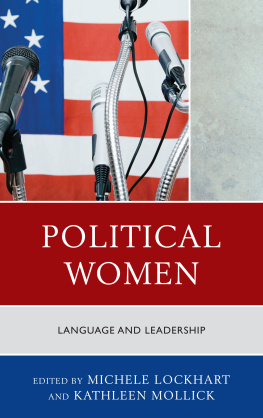
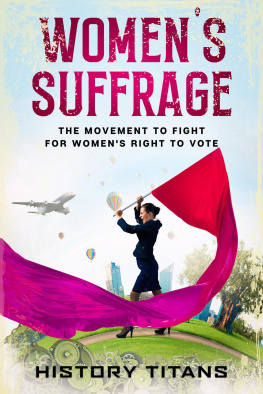
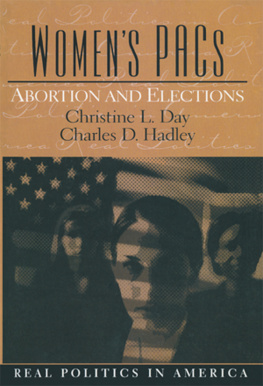
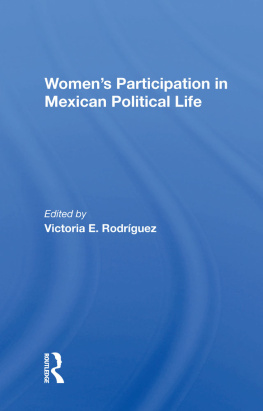

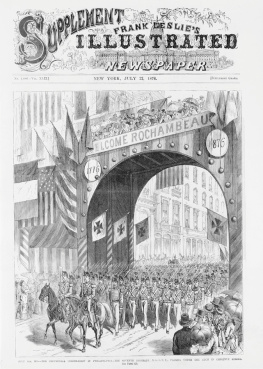
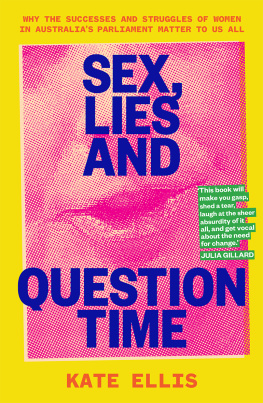
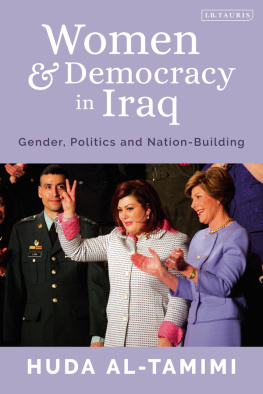
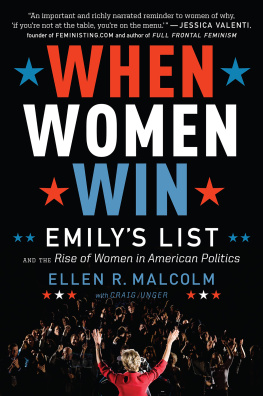

 The paper used in this publication meets the minimum requirements of American National Standard for Information SciencesPermanence of Paper for Printed Library Materials, ANSI/NISO Z39.48-1992.
The paper used in this publication meets the minimum requirements of American National Standard for Information SciencesPermanence of Paper for Printed Library Materials, ANSI/NISO Z39.48-1992.